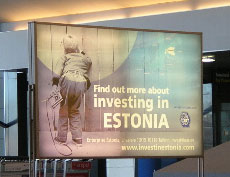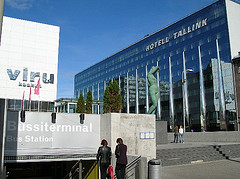 I'm back to Estonia for the first time in nine years. I grew up speaking Estonian, mostly with my mom. My first words were in Estonian, and I've long felt an inexplicably strong connection to this place--much more than I feel a connection to, say, where I grew up. I've only ever been here a handful of months in total, but I've never felt more 'at home' anywhere else.
I'm back to Estonia for the first time in nine years. I grew up speaking Estonian, mostly with my mom. My first words were in Estonian, and I've long felt an inexplicably strong connection to this place--much more than I feel a connection to, say, where I grew up. I've only ever been here a handful of months in total, but I've never felt more 'at home' anywhere else.
The last time I was here, I was sixteen. I only had a skeleton of my worldview at that point. Bones but no muscle.
So I've arrived with no plan at all, a vague intention to visit family and friends (almost all of whose primary connection is to my mother) and a set of questions about politics and history.
After a few days here, the main puzzle so far concerns the uncanny familiarity that I feel for this place. Does it come from some pre-conscious ancestral or cultural-linguistic rhizomatic entanglement? Or is it simply that capitalism has had access to the country for long enough to render it indistinguishable from any other place I've been, and thus deeply familiar in a particular way?
I doubt it's one or the other.
From Canada
 The questions I have stem from the appearance that Estonia is in many respects like Canada, except moreso. Colonized indigenous nations (Estonians have been colonized for a few hundred years more), tense relations with a settler population (though in Estonia, Russians are a minority), a small country (Estonia, pop. 1.5 million) forced to appease foreign powers.
The questions I have stem from the appearance that Estonia is in many respects like Canada, except moreso. Colonized indigenous nations (Estonians have been colonized for a few hundred years more), tense relations with a settler population (though in Estonia, Russians are a minority), a small country (Estonia, pop. 1.5 million) forced to appease foreign powers.
The main difference is that Estonia has been blindsided by capitalism. A national consensus that Soviet rule (and thus anything communist-related) really, really sucks, built up over fifty-plus years of repression, culminated in the Singing Revolution, when 250,000 people defied Russian tanks and troops to sing banned songs. Independence was declared shortly thereafter, with the collapse fo the USSR not far behind.
Since then (the) Estonia(n elite), like (that of) many former Soviet republics, embraced capitalism wholeheartedly. Like Armenia (for example), cultural freedom has expanded while the freedom to subsist has subsided. It's not quite the wholesale privatization-without-benefits of Armenia, but prices are a-rising.
What I notice on the ground right away, though, is the apparent lack of psychological defense mechanisms that decades (rather than a decade) of life under capitalism compels one to develop.
Walking around in the brand-new shopping mall there's a feverishness of consumption that I don't notice in North American malls. (I don't know how to describe it more than that. Consuming shiny things is still new and appetites are less easily satiated, I suppose. The manic new drug addict vs. the jaded long-time user.)
More tangibly, the advertising is several steps short of subtle. A prominent ad from a cell phone company proclaims that "if you really care about your kids", you'll get them a cell phone. The leader of Keskerakond, Edgar Savisaar, made substantial electoral gains after he sent all pensioners in Tallinn (where he was on city council) an extra 500EEK ($50CDN) and a card featuring a photo of him at Christmas time.
Over the next week, I'm going to try to keep track of conversations, anecdotes and photos. The comment feature doesn't work, but I'd be happy to post commentary sent to me at dru at dru dot ca.